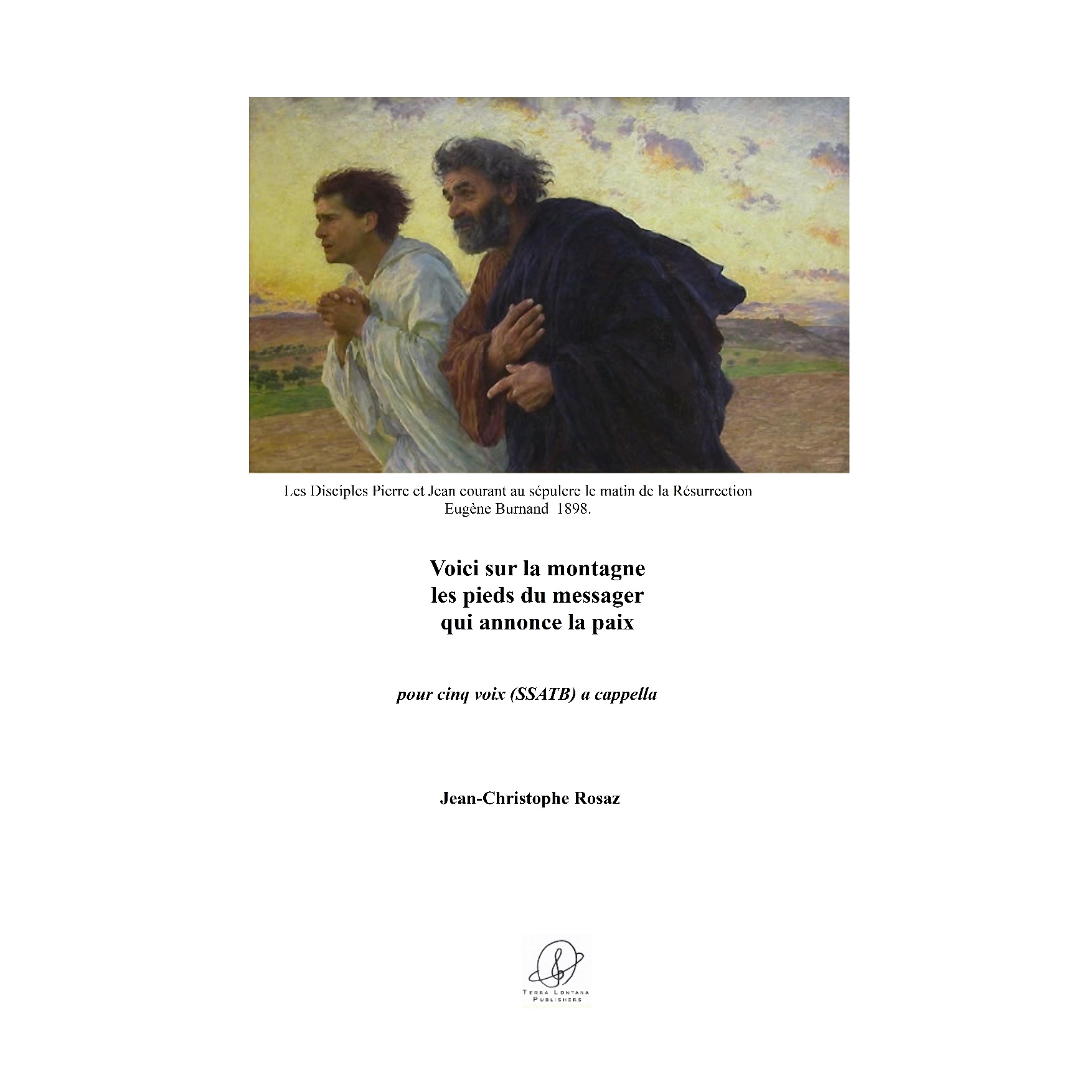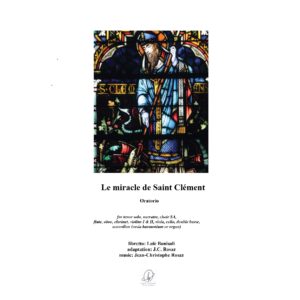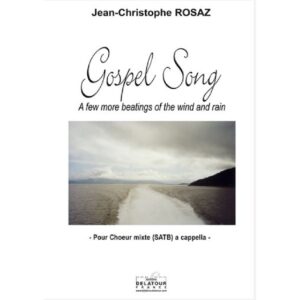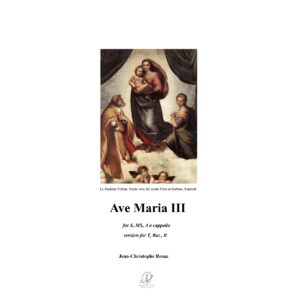Voici sur la montagne les pieds du messager qui annonce la paix – for choir a cappella
for a cappella choir SSATB
music: Jean-Christophe Rosaz
words: Jean-Pierre Sonnet & Cantique des Cantiques 2:8 2,8
adaptation: JC Rosaz
durée: env. 7’30
Description
La tombe était ouverte et lui déjà au loin, partir voler rebondir la forge du coeur attisée d’un souffle intense immensément profond sur les pas de l’Évangile la joie comme un espace à parcourir comme un abîme à survoler. Le voici: il vient! Sautant par-dessus les monts, bondissant par-dessus les collines au loin déjà, partir voler au loin…
The grave was open and he already far away, leave fly bounce the forge of the heart fanned by an intense breath immensely deep in the footsteps of the Gospel joy like a space to explore like an abyss to fly over. Here it is: he is coming! Jumping over the mountains, leaping over the hills far away already, leave fly far away…
—
Quand Patrick Marié m’a invité à composer une nouvelle pièce en lien avec le célèbre Membra Jesu de Buxtehude, je suis tout d’abord parti du texte mis en musique par le compositeur et c’est ainsi que je suis tombé sur le poème de Jean-Pierre Sonnet. Je voulais prolonger cette idée de « corps du Christ » : quoi de mieux alors que deux apôtres courant au sépulcre dont la pierre a été roulée et resté vide: corps insaisissable! J’ai à l’esprit cette dalle de pierre où l’on voit la trace laissée par les pieds d’un de nos ancêtres, à jamais immortalisée! Ce choeur peut se glisser après le n° 4 ( « Lève toi, mon amie, Ma belle, et viens, Ma colombe qui te tiens dans les fentes du rocher, Dans les parois escarpées » ) ou être donné séparément. Je me suis bien sûr imprégné de la magnifique musique de Buxtehude pour laquelle Bach parcouru 450 kilomètres… à pied! Au commencement on entend le bruit des pas de Jean et Pierre puis la musique décrit ce lointain dans lequel l’âme espère ardemment s’envoler (chemin sur lequel il nous faut apprendre aussi à rebondir!). Puis la chaleur du cœur est traduite par ces quintes qui s’ouvrent jusqu’à un accord de neuvième au voix d’hommes qui sera repris par les femmes comme une émanation supérieure. Passe le murmure de l’Evangile, seul le mot « joie » demeure. « Espace, abîme, sur-voler » : une fois parvenus sur ces hauteurs, nous voici au-delà des mots! « Le voici, il vient »: la même harmonie de 9ème qui ouvre l’esprit se fait entendre, c’est le Christ qui est le coeur de toute chose. La musique comme suspendue aux mots, à son tour bondit jusqu’à se fondre dans cet ailleurs, « au loin… »
When Patrick Marié invited me to compose a new piece linked to the famous Membra Jesu by Buxtehude, I first started with the text set to music by the composer and that is how I came across the poem by Jean-Pierre Sonnet. I wanted to extend this idea of « the body of Christ »: what could be better than two apostles running to the sepulcher whose stone had been rolled away and remained empty: elusive body! I have in mind this stone slab where we see the mark left by the feet of one of our ancestors, forever immortalized! This chorus can slip after No. 4 (« Rise up, my friend, My beautiful, and come, My dove who holds you in the cracks of the rock, In the steep walls ») or be given separately. I of course immersed myself in the magnificent music of Buxtehude for which Bach traveled 450 kilometers… on foot! At the beginning we hear the sound of Jean and Pierre’s footsteps then the music describes this distance into which the soul ardently hopes to fly away (a path on which we must also learn to bounce back!). Then the warmth of the heart is translated by these fifths which open up to a ninth chord in the voice of men which will be taken up by women like a superior emanation. The murmur of the Gospel passes, only the word “joy” remains. “Space, abyss, over-flying”: once we reach these heights, we are beyond words! “Here he comes, he comes”: the same 9th harmony which opens the mind is heard, it is Christ who is the heart of all things. The music, as if suspended from the words, in turn leaps until it blends into this elsewhere, « far away… »




